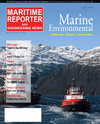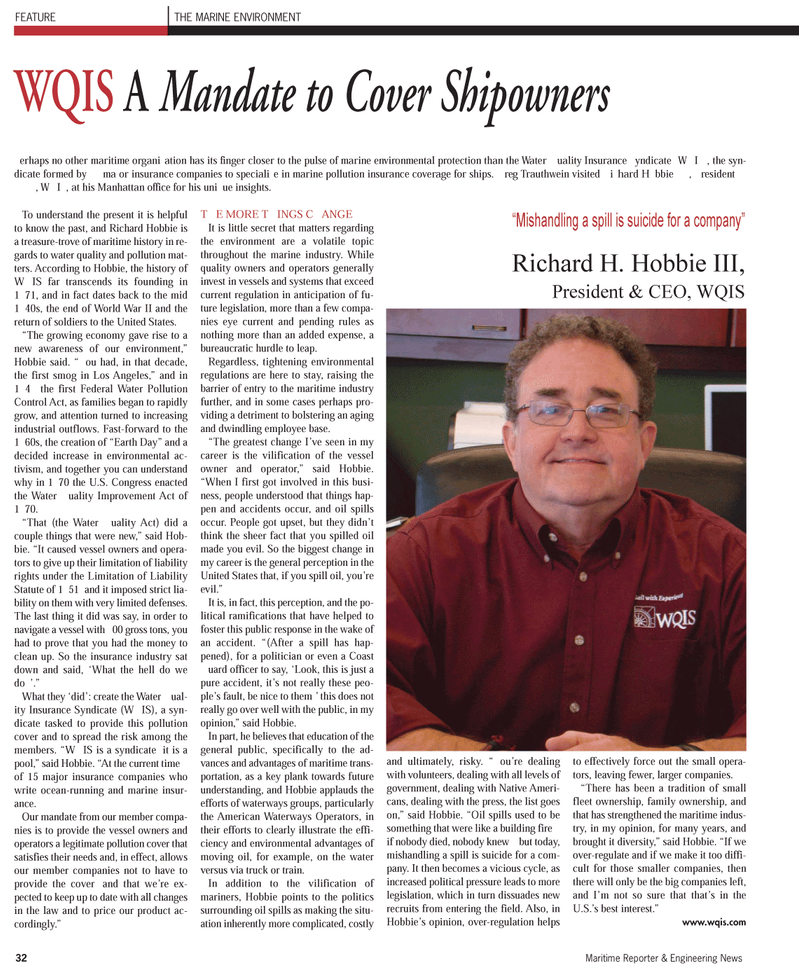
Page 32: of Maritime Reporter Magazine (July 2011)
The Green Ship Edition
Read this page in Pdf, Flash or Html5 edition of July 2011 Maritime Reporter Magazine
32Maritime Reporter & Engineering News To understand the present it is helpful to know the past, and Richard Hobbie is a treasure-trove of maritime history in re- gards to water quality and pollution mat- ters. According to Hobbie, the history of WIS far transcends its founding in 171, and in fact dates back to the mid 140s, the end of World War II and the return of soldiers to the United States.?The growing economy gave rise to a new awareness of our environment,? Hobbie said. ?ou had, in that decade, the first smog in Los Angeles,? and in 14 the first Federal Water Pollution Control Act, as families began to rapidly grow, and attention turned to increasing industrial outflows. Fast-forward to the 160s, the creation of ?Earth Day? and a decided increase in environmental ac- tivism, and together you can understand why in 170 the U.S. Congress enacted the Water uality Improvement Act of 170. ?That (the Water uality Act) did a couple things that were new,? said Hob- bie. ?It caused vessel owners and opera- tors to give up their limitation of liability rights under the Limitation of LiabilityStatute of 151 and it imposed strict lia- bility on them with very limited defenses. The last thing it did was say, in order to navigate a vessel with 00 gross tons, you had to prove that you had the money to clean up. So the insurance industry satdown and said, ?What the hell do we do?.? What they ?did?: create the Water ual- ity Insurance Syndicate (WIS), a syn- dicate tasked to provide this pollution cover and to spread the risk among the members. ?WIS is a syndicate it is a pool,? said Hobbie. ?At the current time of 15 major insurance companies whowrite ocean-running and marine insur- ance. Our mandate from our member compa-nies is to provide the vessel owners and operators a legitimate pollution cover that satisfies their needs and, in effect, allows our member companies not to have to provide the cover and that we?re ex- pected to keep up to date with all changes in the law and to price our product ac- cordingly.? TE MORE TINGS CANGE It is little secret that matters regarding the environment are a volatile topic throughout the marine industry. While quality owners and operators generally invest in vessels and systems that exceed current regulation in anticipation of fu- ture legislation, more than a few compa- nies eye current and pending rules as nothing more than an added expense, a bureaucratic hurdle to leap. Regardless, tightening environmental regulations are here to stay, raising the barrier of entry to the maritime industryfurther, and in some cases perhaps pro- viding a detriment to bolstering an agingand dwindling employee base. ?The greatest change I?ve seen in my career is the vilification of the vessel owner and operator,? said Hobbie. ?When I first got involved in this busi- ness, people understood that things hap-pen and accidents occur, and oil spills occur. People got upset, but they didn?t think the sheer fact that you spilled oil made you evil. So the biggest change in my career is the general perception in theUnited States that, if you spill oil, you?re evil.? It is, in fact, this perception, and the po- litical ramifications that have helped to foster this public response in the wake of an accident. ?(After a spill has hap-pened), for a politician or even a Coast uard officer to say, ?Look, this is just a pure accident, it?s not really these peo- ple?s fault, be nice to them? this does not really go over well with the public, in my opinion,? said Hobbie. In part, he believes that education of the general public, specifically to the ad- vances and advantages of maritime trans- portation, as a key plank towards future understanding, and Hobbie applauds theefforts of waterways groups, particularly the American Waterways Operators, in their efforts to clearly illustrate the effi- ciency and environmental advantages of moving oil, for example, on the water versus via truck or train. In addition to the vilification of mariners, Hobbie points to the politicssurrounding oil spills as making the situ-ation inherently more complicated, costlyand ultimately, risky. ?ou?re dealing with volunteers, dealing with all levels of government, dealing with Native Ameri- cans, dealing with the press, the list goeson,? said Hobbie. ?Oil spills used to be something that were like a building fire if nobody died, nobody knew but today, mishandling a spill is suicide for a com-pany. It then becomes a vicious cycle, as increased political pressure leads to morelegislation, which in turn dissuades new recruits from entering the field. Also, in Hobbie?s opinion, over-regulation helps to effectively force out the small opera- tors, leaving fewer, larger companies. ?There has been a tradition of smallfleet ownership, family ownership, and that has strengthened the maritime indus-try, in my opinion, for many years, and brought it diversity,? said Hobbie. ?If we over-regulate and if we make it too diffi- cult for those smaller companies, thenthere will only be the big companies left,and I?m not so sure that that?s in the U.S.?s best interest.? www.wqis.com THE MARINE ENVIRONMENTFEATURE WQIS A Mandate to Cover Shipowners erhaps no other maritime organiation has its finger closer to the pulse of marine environmental protection than the Water ualit y Insurance yndicate WI, the syn- dicate formed by maor insurance companies to specialie in marine pollution insurance coverage for ships. reg Trauthwein visite d ihard Hbbie , resident , WI, at his Manhattan office for his uniue insights. ?Mishandling a spill is suicide for a company? Richard H. Hobbie III, President & CEO, WQIS

 31
31

 33
33
